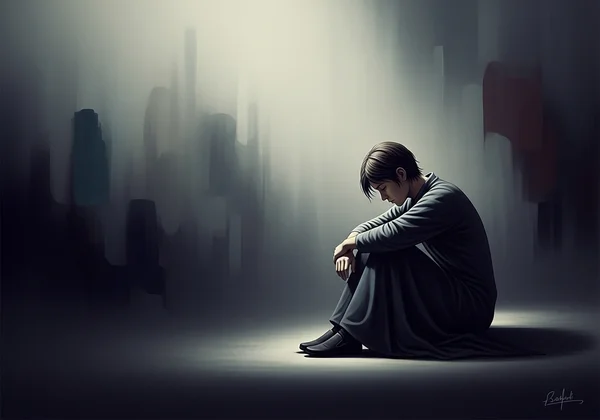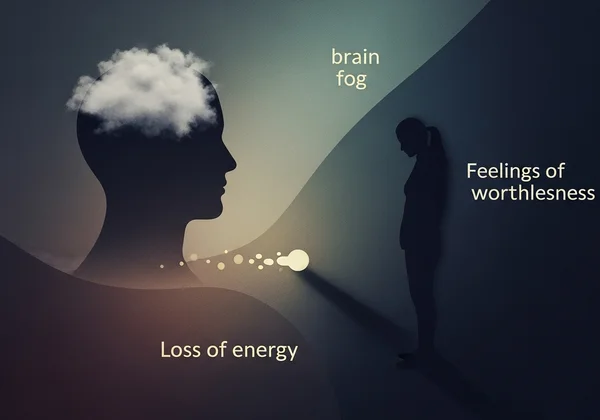Am I Depressed? Understanding the Signs and When to Seek Help
August 10, 2025 | By Owen Buckley
Medically reviewed by Dr. Jane Doe, Psy.D. on October 26, 2023
Wondering, "Am I depressed?" is a heavy question to carry, and seeking answers is a brave first step. While feeling down is a universal human experience, persistent feelings of emptiness, sadness, and a loss of interest in life may point toward something more serious, like major depressive disorder.
This article is designed to help you understand the common signs of depression and provide clear guidance on next steps. It is for informational purposes only and is not a substitute for a professional diagnosis. If you are struggling, please know that effective treatments are available and you don't have to go through this alone.

In This Article
- What is Clinical Depression?
- Common Signs of Depression (Depression Symptoms)
- What Does Depression Feel Like?
- What Causes Depression?
- What Are Your Next Steps?
What is Clinical Depression?
Clinical depression, or major depressive disorder, is a serious but treatable mood disorder. According to the American Psychiatric Association (APA), it impacts how you feel, think, and handle daily activities, such as sleeping, eating, or working. To be diagnosed with depression, symptoms must be present for at least two weeks.
It's different from sadness, which is a normal reaction to loss or life's challenges. Depression is a persistent condition that doesn't simply go away on its own and can significantly interfere with your daily life.
Common Signs of Depression (Depression Symptoms)
The signs of depression can range from mild and subtle to severe and overwhelming. A healthcare professional looks for a combination of these symptoms persisting over time.
- Persistent Sad, Anxious, or "Empty" Mood: This is more than just feeling blue; it’s a pervasive low mood that colors your entire day, most days.
- Loss of Interest or Pleasure: A noticeable loss of interest in hobbies, social activities, work, or even sex—things you once enjoyed. This is also known as anhedonia.
- Significant Changes in Appetite or Weight: This can manifest as either a loss of appetite and weight loss or increased cravings and weight gain, unrelated to intentional dieting.
- Sleep Disturbances: Experiencing insomnia (difficulty falling or staying asleep), waking very early, or oversleeping (hypersomnia) are common symptoms.
- Loss of Energy or Increased Fatigue: Feeling physically drained, sluggish, and tired all the time, even small tasks can seem to require a great deal of effort.
- Feelings of Worthlessness or Guilt: Harshly criticizing yourself for faults or fixating on past failures. These feelings are often unrealistic and excessive.
- Difficulty Thinking, Concentrating, or Making Decisions: You might notice "brain fog," have trouble focusing at work, or find that making even simple choices feels impossible.
- Thoughts of Death or Suicide: This can range from passive thoughts like "I wish I wasn't here" to active plans for suicide.
Crisis Support: If you are having thoughts of harming yourself, please seek immediate help. You can connect with people who can support you by calling or texting 988 anytime in the US and Canada. In the UK, you can call 111. These services are free, confidential, and available 24/7.

What Does Depression Feel Like?
Beyond a clinical list of symptoms, many people wonder what depression feels like on a personal level. The experience is different for everyone, but common descriptions include:
- Feeling Numb: Instead of profound sadness, some people feel empty and emotionally blank, as if they are watching their life from behind a glass wall.
- Irritability and Anger: Depression isn't always about sadness. For some, especially men, it can manifest as unusual irritability, frustration, or angry outbursts over minor issues.
- A Sense of Heaviness: A physical feeling of being weighed down, making movement and simple actions feel exhausting.
- Unexplained Aches and Pains: Depression can cause real physical symptoms, including headaches, back pain, or digestive issues that don't respond to typical treatment.
What Causes Depression?
The exact cause of depression is complex and not fully understood. Research from the National Institute of Mental Health (NIMH) suggests it likely results from a combination of factors:
- Brain Chemistry: Neurotransmitters are chemicals that carry signals between brain cells. An imbalance in these chemicals is believed to play a significant role in mood regulation.
- Genetics: Depression can run in families. Having a parent or sibling with depression increases your risk.
- Stressful Life Events: Trauma, the loss of a loved one, a difficult relationship, or any stressful situation may trigger depression in some people.
- Medical Conditions: Certain illnesses, chronic pain, and hormonal changes can contribute to or cause symptoms of depression.
What Are Your Next Steps?
If these descriptions and signs of depression resonate with you, it’s important to take action. Recognizing the problem is the first step toward feeling better.

1. Take a Confidential Online Depression Test
An online depression test can be a useful starting point. It can help you organize your thoughts and see if your symptoms align with those of clinical depression before you speak to a professional. These screening tools are not a diagnosis but can provide valuable personal insight.
2. Speak With a Healthcare Professional
This is the most crucial step. Schedule an appointment with your primary care doctor or a mental health specialist. They can conduct a thorough evaluation, rule out other medical causes for your symptoms, and provide an accurate diagnosis. Consider reading about how to talk to a doctor about your mental health to prepare for your appointment.
3. Explore Treatment Options
Depression is highly treatable. Common and effective treatments include:
- Psychotherapy: Also known as talk therapy, this involves speaking with a mental health professional. Cognitive Behavioral Therapy (CBT) is one highly effective form.
- Medication: Antidepressants can help correct brain chemistry imbalances.
- Lifestyle Changes: Regular exercise, a balanced diet, and a consistent sleep schedule can support your overall mental well-being.
Ready to Take the Next Step?
Understanding your symptoms is the first move toward regaining control. Our free, private depression test is based on the official PHQ-9 questionnaire used by healthcare professionals. It takes less than 5 minutes and can give you a better understanding of what you're experiencing.
Take Our Free, Confidential Depression Test Now
Disclaimer: This article is for informational purposes only and does not constitute medical advice. The information contained herein is not a substitute for and should never be relied upon for professional medical advice, diagnosis, or treatment. Always seek the advice of your physician or other qualified health provider with any questions you may have regarding a medical condition.